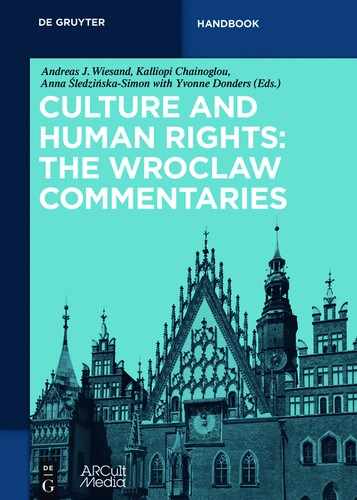0%
38Chapters
0-1Hours read
0kTotal Words
Table of Contents
- Title Page
- Copyright
- Acknowledgments
- Table of Contents
- List of Abbreviations
- Preface I
- Preface II
- Introduction
- Part I: Overview articles (Scientific Committee)
- Culture and Human Rights: Concepts, Instruments and Institutions
- Freedom of Expression in the Arts and Media
- Cultural Diversity and Cultural Identity in Human Rights
- Access to Culture, Media, Information in the Digital Age
- Rights and Protection of Social/Socio-cultural Groups
- Freedom of Religion or Belief
- Cultural Heritage in the Human Rights System
- Part II: Keyword articles
- Access Control Technologies
- Administration
- Affirmative Action
- African Human Rights System
- Alliance of Civilizations
- Archaeological Heritage
- Architectural Heritage
- Armed Conflict
- Artists’ Freedom of Expression
- Arts Education
- Asian Values
- Assembly and Association
- Authors’ Rights / Copyright
- Belief
- Blasphemy
- Caricatures / Cartoons
- Censorship
- Charter of Fundamental Rights of the European Union (CFR)
- Children
- Churches
- Circumcision
- Citizenship
- Clash of Civilisations
- Common Values
- Community Identification
- Constitutional Courts
- Conversion
- Council of Europe (CoE)
- Court of Justice of the European Union (CJEU)
- Cultural Autonomy
- Cultural Dimensions of Human Rights
- Cultural Expressions
- Cultural Genocide
- Cultural Identity
- Cultural Institutions / Infrastructure
- Cultural Policy
- Defamation
- Development
- Digital Media
- Disabilities
- Disability and Copyright
- Discrimination
- Dissidents
- ECHR Cultural Protocol Debates / CAHMIN
- Equality
- European Committee of Social Rights
- European Convention on Human Rights (ECHR)
- The European Court of Human Rights (ECtHR)
- European Union
- European Union Agency for Fundamental Rights (FRA)
- Female Genital Mutilation
- Food
- Free trade
- Fundamentalism
- Gender Stereotypes
- Golden Rule
- Governments
- Hate Crimes
- Hijab
- Historical Truth
- Housing
- Human Dignity
- Human Rights Council
- Human Security
- Hybridity
- Illicit Trafficking of Cultural Objects
- Impact Assessment
- Indigenous Peoples
- Information
- Intangible Cultural Heritage
- Intellectual Property and Human Rights
- Inter-American Human Rights System
- Intercultural Competence
- International Covenant on Economic, Social and Cultural Rights (ICESCR)
- Internet Access
- Internet Content Suppression
- Investigative Journalism
- Journalists
- Landscapes
- Language Rights in Europe
- Languages of Migrants
- LGBT
- Libraries
- Literary Expressions
- Margin of Appreciation
- Media Content
- Migrants
- Movement of Cultural Objects
- Names
- National Minorities
- Older Persons
- Organisation for Security and Cooperation in Europe (OSCE)
- Parody
- Participation in Cultural Life
- Peoples’ Rights
- Pornography / Obscenity
- Poverty
- Press Freedom
- Privacy
- Producers
- Public Broadcasting
- Public Space
- Refugees
- Regional and Minority Languages
- Religious Education
- Religious Minorities
- Religious Symbols
- Restitution and Return of Cultural Objects
- Right to Science and Culture
- Roma Culture
- Secularism and Islamic Law
- Social Media
- Status of Artists
- Trolling and Shitstorms
- UN Treaty Bodies
- Underwater Cultural Heritage
- UNESCO
- Universal Declaration of Human Rights (UDHR)
- Universalism and Cultural Relativism
- Urban Planning
- Values
- Whistleblowing
- Youth
- Part III: Subject index
- Part IV: Biographical notes of contributors
